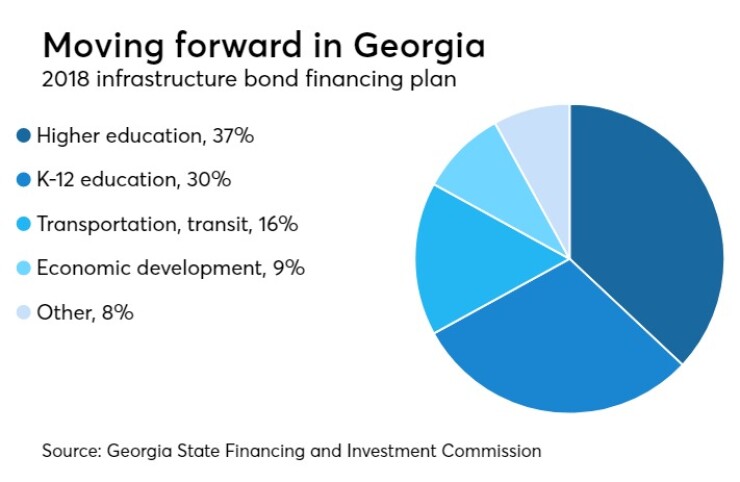Top-rated Georgia brings $1.23 billion of state general obligation bonds to market with a new marketing strategy prompted by recent changes in the federal tax laws.
Georgia’s annual GO infrastructure bond sale prices competitively Tuesday.

The deal consists of $840.6 million of tax exempt, fixed-rate bonds and $389.1 million of taxable bonds.
Georgia comes to market annually, but it hasn’t used special marketing features, such as providing potential investors with an internet road show presentation, until this year.
The Tax Cuts and Jobs Act signed into law days before Christmas prompted the state to re-evaluate.
“This was our first year posting a roadshow,” said Diana Pope, director of the Georgia State Financing and Investment Commission. “We thought that with recent changes to federal tax laws, which affect both current owners and potential new purchasers of municipal bonds, such as lower corporate tax rates, it would be helpful to highlight the state’s credit strengths and provide financial updates in a more of a summary format for potential purchasers that might not be as familiar with the credit.”
Bond proceeds will be used to fund a variety of capital projects.
Although the deal is selling nearly a week after the Fed raised the target range for the federal funds rate by 25 basis points, Pope said she doesn’t believe the interest rate hike should affect pricing much.
“We think the market most likely already had factored in the expectation of higher rates beginning with the announcement on June 13,” Pope said. “Additional economic news and U.S. and world events, of course, could have an impact on rates going forward.”
Alan Schankel, managing director at Janney Montgomery Scott, struck a similar tone in his Monday Daily Fix commentary.
“Last week’s Fed announcement offered little surprise, and tax free bond markets took it in stride, finishing the week with the yield curve a bit steeper but otherwise little changed,” he said. “Short end strength in munis persists.”
Schankel said the two-year benchmark yield is 17 basis points lower since Memorial Day, while similar maturity Treasury bond yields are 7 basis points higher.
Georgia’s bonds will be sold in four parts: $411.65 million of 2018A Tranche 1 tax-exempt GOs with maturities between one and 10 years; $428.96 million of 2018A Tranche 2 tax-exempt GOs with maturities from 11 years to 20 years; $210.44 million of 2018B Tranche 1 taxable GOs with maturities of up to 10 years; and $178.65 million of 2018B Tranche 2 taxable GOs with 11- to 20-year maturities.
Bids for each tranche will be taken at different times Tuesday on Ipreo’s BiDCOMP/PARITY System.
“It is our expectation that our issue will do well in relation to market conditions partly because of the heavy June/July reinvestment season, as well as the historically strong demand for the state’s bonds, which continue to be rated triple-A by three major rating agencies,” Pope said.
The bonds are rated triple-A by Fitch Ratings, Moody's Investors Service and S&P Global Ratings. All have stable outlooks.
Analysts lauded Georgia for its conservative debt management and strong fiscal governance. They also cited its low long-term liability and pension burdens, full funding of the state's portion of pension contributions, and the creation of other post-employment benefit fund reserves.
As the eighth-most populous state in the U.S., according to the roadshow presentation, Georgia has been rated Aaa by Moody’s since 1974. Fitch has rated the state’s GOs AAA since 1993, while S&P gave its highest-rating to the Peach State in 1997.
The state’s gross domestic product growth exceeded the U.S.’s for the past four years, while growth in personal income has exceeded the U.S.’s since 2013. As of April, Georgia’s unemployment rate was 4.3%, down from 4.9% in April 2017.
The state has also adopted a phased approached to its own tax reforms because of tax code changes, with the objective of being revenue neutral, the presentation said. Enacting changes to deductions and income tax rates between 2018 and 2020 will allow the state to analyze the actual impact of the federal legislation and taxpayers' behavior, it said.
“Georgia’s leadership has shown a commitment to making decisions that support a triple, triple-A credit rating, such as building the state’s rainy day fund to $2.3 billion or 9.9% of revenues, and investing in needed infrastructure at the lowest possible cost,” Pope said. “We are excited about the rewards of those decisions in building projects that will have a positive impact for years to come.”
Another recent decision the state made was to use the Boston-based financial technology company BondLink’s municipal bond platform, to provide prospective investors with additional outreach.
“After the sale we will be reviewing the BondLink metrics to see how this platform assists us in providing information to that particular buyer group,” Pope said.
Public Resources Advisory Group and Terminus Municipal Advisors LLC are co-financial advisors to the state. Gray Pannell & Woodward LLP is bond counsel. Kutak Rock LLP is disclosure counsel.





